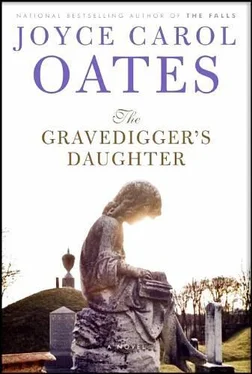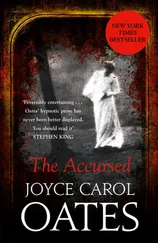Rebecca laughed, remembering. Knuckles jammed against her mouth.
But it was funny. You had to have a sense of humor to appreciate Niles Tignor. He expected you to make him laugh.
She lay on her back now. Sometimes that worked. Her muscles began to twitch. There was her damn hand drifting near the God damn stamping machine…She drew it back just in time.
In some other universe it might’ve happened. Her hand mangled like meat. Severed from her arm. What she deserved, stupid cunt not watching what she was doing.
How Tignor would stare! Rebecca had to laugh, imagining.
He’d hated her big-whale belly. Staring in fascination, and couldn’t keep his hands off.
The way the wind blew in the yew trees. A sound like voices jeering. This was the old Wertenbacher farm, so-called still in the neighborhood. By now, three years later, Rebecca would have thought they would have their own house.
He did love them. Her and Niley. In his heart he was not unfaithful.
In his heart, her father Jacob Schwart had loved her. He had loved them all. He had not meant to hurt them, he had only meant to erase history.
You are one of them. Born here .
Was this so? She hugged herself, smiling. Drifting at last into sleep as into a stone well so deep it had no bottom.
November 1936. By bus the Schwart family arrived in this small town in upstate New York. Out of nowhere they seemed to have come, with bulging suitcases, valises, bags. Their eyes were haggard in their faces. Their clothes were disheveled, their hair uncombed. Obviously, they were foreigners. “Immigrants.” It would be said of the Schwarts that they looked like they’d been on the run from the Führer (in 1936, in such places as Milburn, New York, it was possible to think of Adolf Hitler with his mustache and military posture and stark staring eyes as comical, not unlike Charlie Chaplin) without stopping to eat, breathe, wash.
The smell that came off ‘em!-the bus driver would so comment, rolling his eyes.
It seemed appropriate that Jacob Schwart, the head of the family, would find work as caretaker of the Milburn Township Cemetery, a nondenominational cemetery at the ragged edge of town. He and his family-wife, two sons, infant daughter-would live in the weathered stone cottage just inside the cemetery gates. This “cottage” was rent-free, which made the job attractive to a man desperate for a place to live.
Mr. Schwart was profusely grateful to the township officials who hired him though he’d had no experience as a cemetery caretaker, nor even as a gravedigger.
He was a good worker, he insisted. With his hands, and with his head.
“You will not regret, sirs. I will assure you.”
At the time they’d moved into the cobwebby stone cottage in the cemetery, that had been only casually cleared after the departure of the previous tenants, and smelled strongly of something like liquid lye, the Schwarts’ youngest child Rebecca was a sickly five-month-old infant tightly wrapped in her mother’s filthy shawl. For much of the bus ride from downstate New York, this shawl had functioned as a sort of secondary diaper for the fretting infant.
So little she was, her brother Herschel would afterward recall, she looked like some hairless thing like a baby pig, and smelled like one, too. “Pa wouldna look at you hardly, he was thinkin you would die I guess.”
Had she been Rebecca Esther Schwart then? She’d had no name and no identity, so young. Of those early days and weeks, months, and finally years in Milburn she would recall so little. For there was little memory in the Schwart family.
There was Ma, who nursed her. Ma who sometimes pushed her away with a grunt, as if her touch was painful.
There was Pa. “Jacob Schwart” he was. You could not predict Pa. Like the sky Pa was always changing. Like the ugly coal-burning stove in the kitchen Pa was smoldering sometimes, flaring-up sometimes. You would not wish to press your fingers experimentally against the stove when the fire was up inside.
Other times, the stove was empty of fire. Cold, dead.
Jacob Schwart was profusely grateful to be hired by strangers in this small country town. Yet Pa, brooding in the stone cottage, expressed a different sentiment.
“Like a dog they wish to treat me, eh! ”Jay-cob‘ I am, eh! Because I am foreign, I am not-rich, I am not one of them! One day they will see, who is a dog and who is a man.“
Already as an infant she would begin to acquire an instinctive sense that her father, this powerful presence that leaned over her crib, sometimes poked her with wondering fingers, and even lifted her in his arms, had been grievously wounded in his soul; and would bear the disfigurement of this wound, like a twisted spine, through his life. She seemed to know, even as she shrank from such terrible knowledge, that she, the last-born of the family, the little one , had not been wanted by Jacob Schwart and was an outward sign of his wound.
She would not know why, a child does not ask why.
She would remember her panicked mother stumbling to her crib, clamping a moist hand over her mouth to muffle her crying. That Pa not be wakened from his exhausted sleep in the next room.
“No! Please no! He will murder us both.”
And so Jacob Schwart slept. Twitching and moaning in his sleep like an injured animal. After ten, twelve hours working in the cemetery in those early days he fell onto the bed in his work clothes, stinking of sweat, heavy mud-splattered boots still laced to his feet.
These boots he’d found in the shed. They had belonged to the previous Milburn cemetery caretaker, he supposed.
Too big for his feet. He’d stuffed the toes with rags.
Like hooves they seemed to him, his feet in these boots. Heavy, bestial. He dreamt of plunging into water, into the ocean, wearing such boots and being unable to unlace them, to swim and save himself.
History has no existence . All that exists are individuals, and of these, only individual moments as broken off from one another as shattered vertebrae . These words he hand-printed, gripping a pencil clumsily in his stiffening fingers. He had so many thoughts! In the cemetery his head was invaded by hornet-thoughts he could not control.
Clumsily he wrote down these thoughts. He wondered if they were his. He stared at them, and pondered them, then crumpled the paper in his hand and tossed it into the stove.
You saw him at a distance: the gravedigger Schwart.
Like a troll he appeared. Somewhat hunched, head lowered.
In the cemetery amid the gravestones. Grimacing to himself as he wielded a scythe, a sickle, a rake; as he pushed the rusted hand-mower in fierce and unvarying swaths through the dense crabgrass; as he dug out a grave, and carted away excess soil in a tipsy wheelbarrow; as he paused to wipe his forehead, and to drink from a jar he carried in his coverall pocket. Tipping back his head, eyes shut and gulping like a thirsty dog.
Schoolboys sometimes squatted behind the cemetery wall that was about three feet in height, made of crude rocks and chunks of mortar, in poor repair. Briars, poison ivy and sumac grew wild along the wall. At the front entrance of the cemetery there was a wrought iron gate that could be dragged shut only with difficulty, and an eroded gravel drive, and the caretaker’s stone cottage; beyond these, there were several sheds and outbuildings. The oldest gravestones ran up practically to the rear of the cottage. To the grassy area where the caretaker’s wife hung laundry on clotheslines stretching between two weathered posts. If the schoolboys couldn’t get close enough to Mr. Schwart to taunt him, or to toss chestnuts or stones at him, they sometimes settled for Mrs. Schwart, who would give a sharp little cry of alarm, hurt, pain, terror, drop what she was doing in the grass, and run panicked into the rear of hovel-house in a way that was very funny.
Читать дальше












